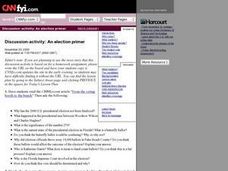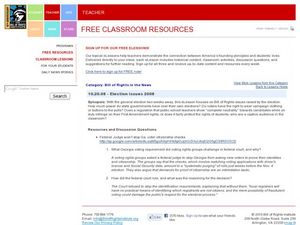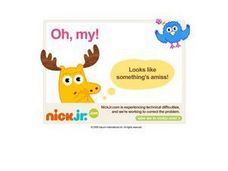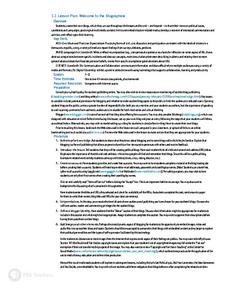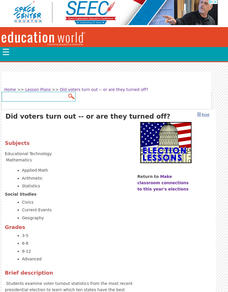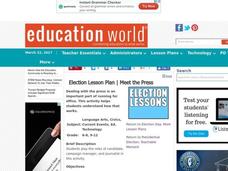Curated OER
It's Up for Debate
In this instructional activity, students investigate the different platforms of each of the Presidential hopefuls for the 2000 election. Small groups each carefully research the platforms of an assigned candidate and then create a...
Curated OER
The Eleventh Hour
Students examine their own understanding of the issues and events that are framing this year's presidential race. They explore the candidates' stances on eight issues and present their findings to the class.
Curated OER
Discussion-Activity: An Election Primer
Students research and discuss the 2000 presidential election. They role-play Al Gore's and George W. Bush's legal teams, and members of the Florida Supreme Court. They of each legal team present their arguments to the Supreme Court.
Curated OER
Primary Concerns
Students articulate their understanding of the primary process, critically evaluate the primary process on a systemic level and explore the significance of the Super Tuesday primaries on a Presidential election.
Curated OER
Reading the Election Results
Students read a chart that shows results of the 1996 presidential election. They answer teacher created questions about the chart.
Curated OER
Bill of Rights in the News: Election Issues 2008
Students consider First Amendment rights. In this Bill of Rights lesson plan, students complete an activity guide regarding constitutional rights issues raised in the 2008 presidential election. Students respond to discussion questions...
Carolina K-12
The Electoral College
Put the Electoral College into perspective with a simulation of an election. Scholars experience an electoral vote, participate in an in-depth discussion on the topic, and engage in a congressional committee where they learn about the...
American Battlefield Trust
1864-1865: Bringing the War to an End
The Civil War—in its breathtaking ferocity—came to a close in 1864. However, turmoil echoed throughout the country's politics, including the presidential context between Lincoln and McClellan. Performing chronology and primary source...
C-SPAN
Electoral College Pros/Cons and Alternatives
If every vote counts, why do we need the electoral college? Middle and high schoolers study the Constitutional precedent of the electoral college, as well as its place in historical and modern elections, with an engaging social studies...
Curated OER
Analyzing the 2000 Election
Students research and analyze the year 2000 presidential election results. They identify the reasons this particular election was so unusual and predict how voting outcomes might affect their communities, the country and the world.
Curated OER
Election Issues '08
Learners research the presidential candidates of 2008. In this election lesson, students research both candidates and identify where they stand on major issues. Learners choose a presidential candidate.
Carolina K-12
Exploring the Electoral College
Does your vote really count? This activity helps young voters learn about the electoral college through a TED talk, a helpful handout, discussion prompts, and then a role-playing activity that has participants simulating...
Carolina K-12
Preventing Voter Fraud or Encouraging Voter Suppression?
The issues of voter fraud and voter suppression are relevant in every election, local as well as national. Soon-to-be voters learn about a recent bill proposed in North Carolina, the Voter Information and Verification Act, and...
Curated OER
Welcome to the Blogosphere
Create a blog spot for your classroom and promote online discussions. There are several blogging websites listed here, and you can create one specific to each class or one collective site. Teach your learners how to post on the blog, and...
Curated OER
The 2004 Presidential Election
Learners examine the 2004 Presidential election between George W. Bush and John Kerry. Using a variety of primary source documents, they discover where the candidates stood on the issues. In groups, they create a tableau in which they...
Curated OER
Voter Turnout
Explore politics by analyzing the voting process. Pupils discuss the purpose of casting votes in an election, then examine graphs based on the data from a previously held election's turnout. The lesson concludes as they answer study...
Curated OER
Primary Source Adventures: Texas Annexation: United We Stand? Lesson Plan
Seventh graders study the national effect that the annexation of Texas had on the 1844 Presidential election using primary source documents which they access through web based sources. They examine slavery in Texas during the 1840's and...
Curated OER
Did Voters Turn Out -- or Are They Turned Off?
What was the voter turnout at your last state election? Examine voter turnout statistics from the most recent election to learn which ten states have the best turnout record. This lesson plan offers election data, handouts, and worksheets.
Curated OER
Meet the Press
Students participate in a role play revolving around political elections. The roles of candidate, campaign manager, and journalist emphasized in this activity. Students listen to candidate interviews that are available online.
Curated OER
The Last Word: Using Critical Thinking and Analysis to Reach a Decision
Want to explore the process of writing a persuasive essay and tie it in with the upcoming elections? Class members use Venn diagrams and the hamburger model of persuasive writing to write a five-paragraph essay on elections and...
C-SPAN
Presidential Birth Requirement
Every president of the United States must be a natural-born citizen, but the definition of natural-born is not as straightforward as it seems. Secondary scholars examine two points of view surrounding the constitutional requirement...
Curated OER
Presidential Sweepstakes
Fifth graders visit the National Gallery of Art and are introduced to portraiture as well as politics and presidents. They use these themes to form political parties and carry out their own "election".
Curated OER
Youth voters and election turnout
Students investigate why 18- to 24- year-olds have a low turnout at the polls. Students develop a plan to encourage young Americans to vote, or write a persuasive essay telling why they should vote.
Roy Rosenzweig Center for History and New Media
Analyzing Political Campaign Commercials
Imagine a lesson that models for learners how to separate facts from opinions. How to detect bias. How to evaluate a source of information. How to identify propaganda. Although designed for middle schoolers, the activities in this packet...
Other popular searches
- 2008 Presidential Elections
- Presidential Elections 1824
- 2io8 Presidential Elections
- 2oo8 Presidential Elections
- Presidential Elections of 08
- U.s. Presidential Elections
- Us Presidential Elections




